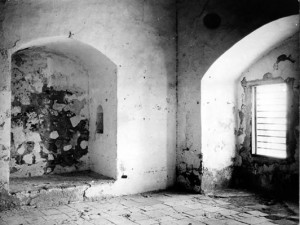Paris Talks: The Sufferings of Bahá’u’lláh
One hundred years ago today ‘Abdu’l-Bahá gave a short talk about His Illustrious Father and spoke primarily of the sufferings of Bahá’u’lláh. The details described by ‘Abdu’l-Bahá of the manner in which Bahá’u’lláh was treated are agonizing to read.
 In reflecting on this address, I am struck by the immensity of the tribulations faced by the Blessed Beauty and His exalted station. I say “struck” but really, to be honest, what He suffered and how this demonstrated who He was are sublime concepts I cannot begin to articulate. To be “struck” is only a spark: I dream of burning with understanding.
In reflecting on this address, I am struck by the immensity of the tribulations faced by the Blessed Beauty and His exalted station. I say “struck” but really, to be honest, what He suffered and how this demonstrated who He was are sublime concepts I cannot begin to articulate. To be “struck” is only a spark: I dream of burning with understanding.
I wish I could have been there, in the Master’s presence, when this talk was delivered. As I read newspaper articles and first-hand accounts of those who beheld ‘Abdu’l-Bahá in the west, I get a glimpse of the greatness of who He was, and how to greatly He was revered — at times being addressed above and beyond His station as the return of Christ. In considering talks such as this one and how glorious ‘Abdu’l-Bahá was, then how much more glorious must Bahá’u’lláh have been? In contemplating this, I am reminded of a quotation from the Guardian:
An attempt I strongly feel should now be made to clarify our minds regarding the station occupied by ‘Abdu’l-Bahá and the significance of His position in this holy Dispensation. It would be indeed difficult for us, who stand so close to such a tremendous figure and are drawn by the mysterious power of so magnetic a personality, to obtain a clear and exact understanding of the rôle and character of One Who, not only in the Dispensation of Bahá’u’lláh but in the entire field of religious history, fulfills a unique function. Though moving in a sphere of His own and holding a rank radically different from that of the Author and the Forerunner of the Bahá’í Revelation, He, by virtue of the station ordained for Him through the Covenant of Bahá’u’lláh, forms together with them what may be termed the Three Central Figures of a Faith that stands unapproached in the world’s spiritual history. He towers, in conjunction with them, above the destinies of this infant Faith of God from a level to which no individual or body ministering to its needs after Him, and for no less a period than a full thousand years, can ever hope to rise. To degrade His lofty rank by identifying His station with or by regarding it as roughly equivalent to, the position of those on whom the mantle of His authority has fallen would be an act of impiety as grave as the no less heretical belief that inclines to exalt Him to a state of absolute equality with either the central Figure or Forerunner of our Faith. For wide as is the gulf that separates ‘Abdu’l-Bahá from Him Who is the Source of an independent Revelation, it can never be regarded as commensurate with the greater distance that stands between Him Who is the Center of the Covenant and His ministers who are to carry on His work, whatever be their name, their rank, their functions or their future achievements. Let those who have known ‘Abdu’l-Bahá, who through their contact with His magnetic personality have come to cherish for Him so fervent an admiration, reflect, in the light of this statement, on the greatness of One Who is so far above Him in station.
The World Order of Bahá’u’lláh, p.132

